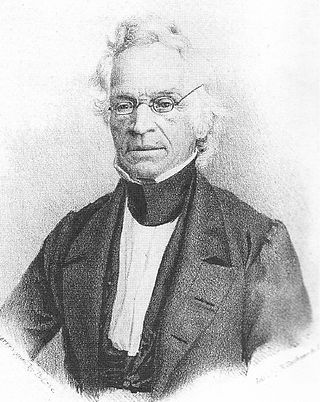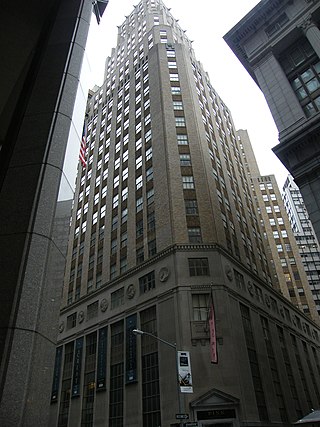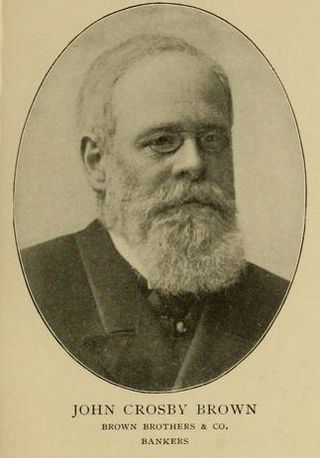
Prescott Sheldon Bush was an American banker and politician.After working as a Wall Street executive investment banker, he represented Connecticut in the United States Senate from 1952 to 1963.A member of the Bush family, he was the father of President George H. W. Bush, and the paternal grandfather of President George W. Bush and Florida Governor Jeb Bush.

Edward Roland Noel "Bunny" Harriman was an American financier and philanthropist.

George Herbert "Bert" Walker Sr. was an American banker and businessman. He was the maternal grandfather of United States President George H. W. Bush and a great-grandfather of President George W. Bush, both of whom were named in his honor. He was also the amateur heavyweight-boxing champion of Missouri while studying law at Washington University.
Kuhn, Loeb & Co. was an American multinational investment bank founded in 1867 by Abraham Kuhn and his brother-in-law Solomon Loeb. Under the leadership of Jacob H. Schiff, Loeb's son-in-law, it grew to be one of the most influential investment banks in the late 19th and early 20th centuries, financing America's expanding railways and growth companies, including Western Union and Westinghouse, and thereby becoming the principal rival of J.P. Morgan & Co.
J.P. Morgan & Co. is an American financial institution specialized in investment banking, asset management and private banking founded by financier J. P. Morgan in 1871. Through a series of mergers and acquisitions, the company is now a subsidiary of JPMorgan Chase, one of the largest banking institutions in the world. The company has been historically referred to as the "House of Morgan" or simply Morgan. For 146 years, until 2000, J.P. Morgan specialized in commercial banking, before a merger with Chase Manhattan Bank led to the business line spinning off under the Chase brand.

Brown Brothers Harriman & Co. (BBH) is the oldest and one of the largest private investment banks in the United States. In 1931, the merger of Brown Brothers & Co. and Harriman Brothers & Co. formed the current BBH.
Brown Shipley is a member of Quintet Private Bank. It is headquartered in London's Moorgate, behind the Bank of England. Brown Shipley offers wealth planning, investment management and lending services for private, corporate and institutional clients. Effective January 2022, the CEO is Calum Brewster.

George Brown was an Irish-American investment banker and railroad entrepreneur.

William Adams was a noted American clergyman and academic.

Alex. Brown & Sons was the first investment bank in the United States, founded by Alexander Brown in 1800 in Baltimore, Maryland. The firm was acquired by Bankers Trust in 1997 to form BT Alex. Brown, and then integrated into Deutsche Bank in 1999 following Deutsche's acquisition of BT. In 2016, Raymond James acquired Deutsche's U.S. private client services unit, operating under the Alex. Brown brand.
The Temporary National Economic Committee (TNEC) was established by a joint resolution of the United States Congress on June 16, 1938, and operated until its defunding on April 3, 1941. The TNEC's function was to study the concentration of economic power and to report to Congress with its findings.
Zachary Karabell is the founder of the Progress Network at New America, president of River Twice Capital, an author, and a columnist. In 2003, the World Economic Forum designated him a "Global Leader for Tomorrow."

63 Wall Street, originally the Wall and Hanover Building, is a 37-story skyscraper on Wall Street in the Financial District of Manhattan in New York City. Built in 1929, it was designed by Delano & Aldrich as the headquarters of Brown Brothers & Co.

John Crosby Brown was a senior partner in the investment bank Brown Bros. & Co., founded by his family.
Wertheim & Co. was an investment firm founded in 1927 by Maurice Wertheim and Joseph Klingenstein, who met when they worked together at Hallgarten & Company. The firm engaged primarily in the merchant-banking business; it invested from its formation until the deaths of Wertheim and one of his senior partners in 1950 and 1952 respectively.
Walter Vincent Shipley II was the chairman and chief executive officer of Chase Manhattan Bank and, previous to that, the company with which it merged Chemical Bank. Shipley was named chief executive of Chemical in 1981 and held the position through 1999 and remained at the bank as chairman through January 2000, just prior to the bank's merger with J.P. Morgan & Co. During his 18-year tenure, Shipley oversaw Chemical's mergers with Texas Commerce Bank in 1987, Manufacturers Hanover in 1991 and Chase Manhattan Bank in 1996.
Roosevelt & Son was an American investment banking firm connected with the Roosevelt family for nearly two centuries. The firm was among the oldest banking houses on Wall Street. Many of the male members of the Roosevelt family worked for the firm in some capacity.
Hallgarten & Company was an investment bank based in New York City that was founded in 1850 by Lazarus Hallgarten, a native of Hesse.
Elbridge Thomas Gerry, known as Ebby Gerry, was an American banker and polo player.
Harriman, Ripley and Company was an investment bank created by the partners of Brown Brothers Harriman after the passage of the Glass Steagall Act mandated firewalls between commercial banks and investment banks. Brown Brothers Harriman positioned itself into a private bank while Harriman Ripley engaged in the marketing and underwriting of securities. Employees were recruited primarily from Brown Brothers Harriman, and also from the National City Bank.









